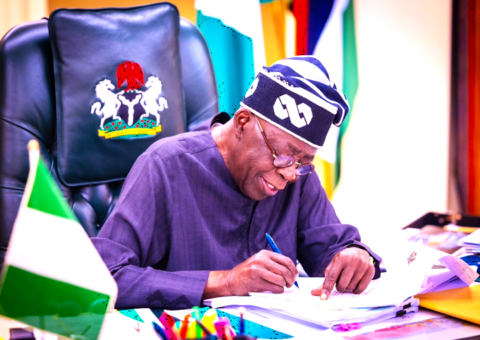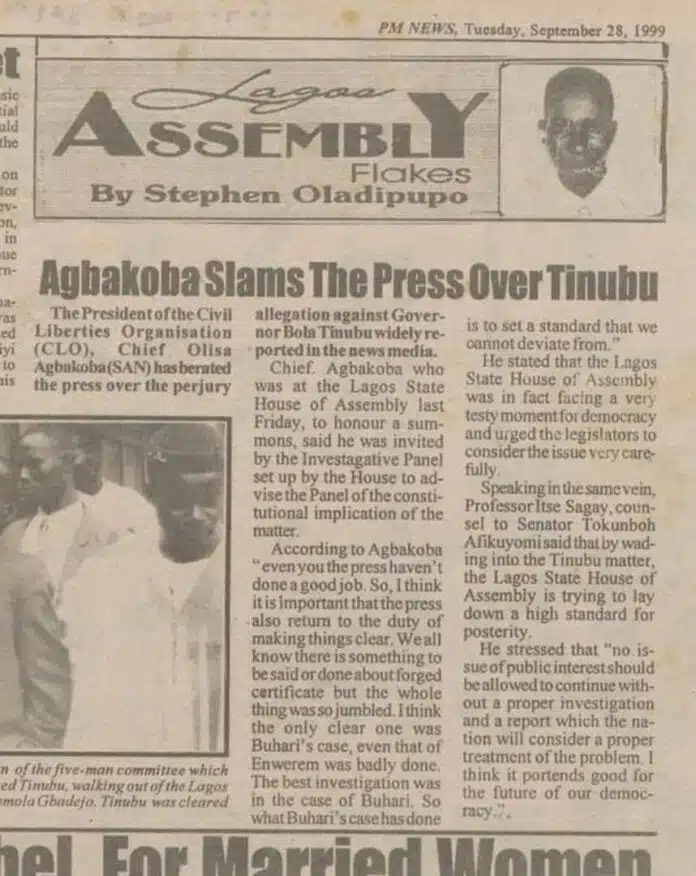By:Joy Musa
Fresh attention is being drawn to long-standing allegations of certificate forgery involving President Bola Ahmed Tinubu, as Director General of The Narrative Force, Aare Amerijoye DOT.B, revisits a case that has lingered in Nigeria’s political consciousness since 1999.
In a sharply worded statement titled “The Ghost of Forgery: How Tinubu’s Truth Was Buried Since 1999,” Amerijoye calls out what he describes as a “systemic failure of the Nigerian press and political institutions” to address the allegations head-on when they first emerged over two decades ago.

The controversy dates back to Tinubu’s time as Governor of Lagos State, when questions were raised about the authenticity of academic qualifications he submitted to the Independent National Electoral Commission (INEC). At the time, legal experts including Chief Olisa Agbakoba, SAN, and Prof. Itse Sagay publicly expressed concern over what they perceived as a lack of due diligence by both the media and the Lagos State House of Assembly.
Media Criticism and Historical Context
Amerijoye’s statement recalls the address by Chief Agbakoba before the Lagos Assembly on September 29, 1999, where the senior advocate sharply criticised the Nigerian press for its failure to uphold investigative standards in the face of serious allegations.
“The media had not done a good job,” Agbakoba had said, adding that while everyone knew something was wrong, “the whole thing was so jumbled.” His remarks were reportedly triggered by what he saw as a compromised investigation into the allegations of forgery and perjury against Tinubu.
Drawing parallels to the cases of former Speaker Salisu Buhari and ex-Senate President Evan Enwerem—both of whom were forced to resign over similar issues—Agbakoba lamented the selective application of justice. According to him, even the Buhari case, which many deemed poorly handled, appeared more credible than the probe into Tinubu’s documents.
Warnings from Legal Scholars
Professor Itse Sagay, another prominent legal mind, also weighed in at the time. He warned that brushing the matter aside could set a dangerous precedent for democracy. “No issue of public interest should be allowed to continue without proper investigation and report,” Sagay cautioned.
Amerijoye argues that Sagay’s and Agbakoba’s warnings have now materialized. “Twenty-six years later, the same Bola Tinubu stands as President, while the same forgery allegation… still trails him like a ghost that refuses to die,” he wrote.
Allegations of Media Complicity
A central theme in the statement is the evolution of the Nigerian press, which Amerijoye accuses of morphing from a watchdog into a “lapdog.” He references the role of Bayo Onanuga, now Special Adviser to President Tinubu on Information and Strategy, who in 1999 oversaw PM News—the platform that first published the forgery reports.
Amerijoye alleges that voices which once demanded accountability are now “mumbling platitudes in defence of fraud.”
Implications for Democracy
The statement closes with a stark warning: “No democracy survives on lies. The foundations of a republic cannot be cemented with forgery.” It calls on Nigerians to reexamine the historical record and confront the truth, regardless of political affiliations.
While President Tinubu has consistently denied all allegations of forgery, and no court has convicted him of such an offence, the matter continues to evoke strong reactions from civil society, legal experts, and political commentators.
Background and Unresolved Questions
In 2023, the controversy regained international attention when Atiku Abubakar, presidential candidate of the PDP, pursued a legal case in a U.S. court seeking academic records from Chicago State University (CSU). While CSU confirmed that Tinubu graduated from the institution, discrepancies around the submitted certificate to INEC reignited public discourse.
To date, President Tinubu has not issued a detailed public rebuttal addressing all inconsistencies, further fueling speculation and division.
As Nigeria grapples with issues of governance, transparency, and democratic consolidation, the Tinubu certificate saga remains one of the most persistent and polarising chapters in the country’s political history.
The resurfacing of this debate raises a fundamental question: Can a nation move forward without first confronting the ghosts of its past?
Editor’s Note: President Bola Ahmed Tinubu has repeatedly denied any wrongdoing in relation to his academic credentials. All individuals are presumed innocent until proven guilty in a court of law.







